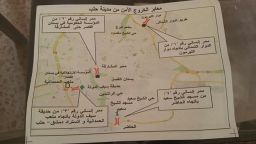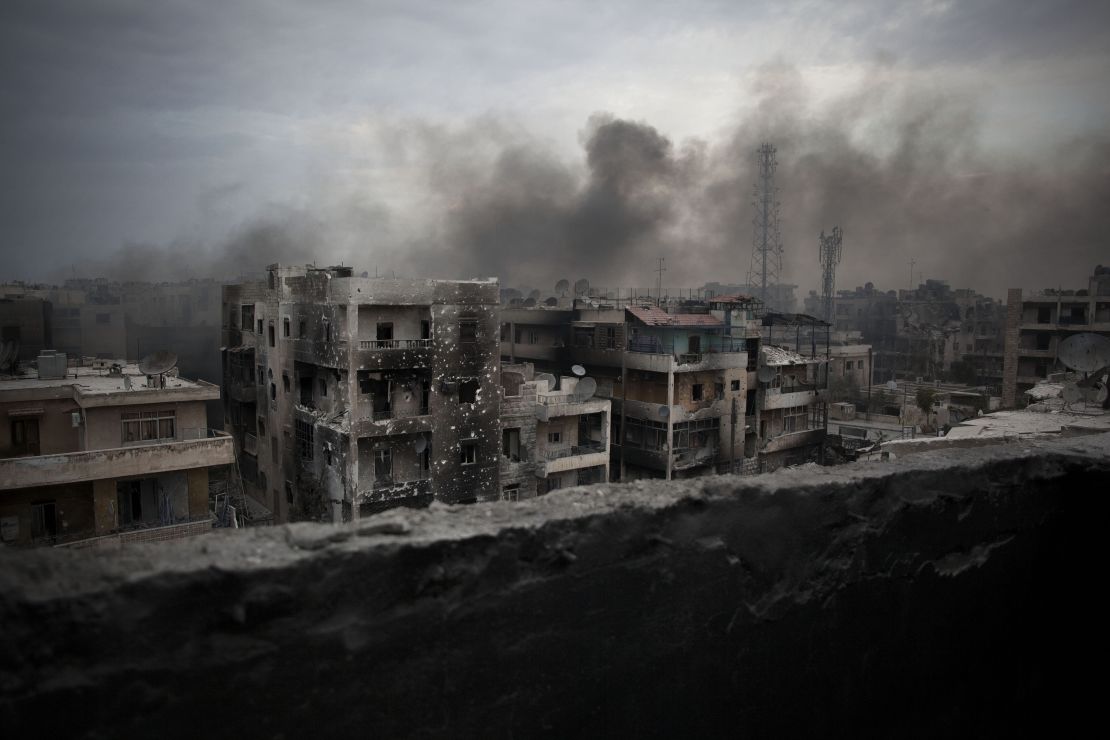Story highlights
New: Leaflets dropped instructing people how to leave Aleppo through special corridors
Amnesty International says corridors won't prevent a humanitarian catastrophe
Syrian and Russian forces are to open humanitarian corridors for people to flee the besieged city of Aleppo, officials in both countries said Thursday, the day after Syria’s army announced it had encircled the city and cut off rebel supply routes.
In a “large-scale humanitarian operation,” three relief corridors would be set up to distribute food and medical aid to civilians, and provide them – along with rebels who chose to surrender – the opportunity to leave the city, Russia’s Ministry of Defense said.
A fourth corridor would be established in northern Aleppo to allow for the withdrawal of armed insurgents, the statement said, calling it an exceptional attempt to spare civilians from violence.
Leaflets were dropped on Thursday over Aleppo with instructions on how to approach checkpoints and a map showing the corridors.
Those wanting to leave are supposed to wave the leaflet with their right hand raised above their head and the other hand either around their head or holding a child’s hand, the leaflet said.
Residents would also be notified by loudspeakers and text messages, a ministry statement said.

But residents in the besieged city are skeptical and reluctant.
The elderly, women and children are likely to leave, Aleppo resident and photojournalist Karam Al Masri said, but men under 40, including himself, are likely to stay, because their fate is unclear if they leave the city into government held territory.
They will wait for a safe corridor toward the western side of the city and Turkey, he said.
People in Aleppo ‘scared and hungry’ as Syrian troops encircle city
Aleppo Gov. Mohammad Olabi announced the opening of three corridors for people to flee the besieged rebel-held neighborhoods in the city’s east, the state-run Syrian Arab News Agency reported – although it made no mention of a fourth corridor.
Speaking to reporters Thursday, Russian Defense Minister Gen. Sergei Shoigu said the joint relief operation was being carried out “to ensure the safety of the residents of Aleppo,” where “a complex humanitarian situation” had developed.
“We have repeatedly called on the warring parties to reconcile, but every time, the militants violated the cessation of hostilities, shelled villages, attacked the positions of government troops,” he said.
The United Nations has warned recently of a potential humanitarian disaster as government troops, backed by Russian air support, tightened their grip on the city, where it says an estimated 200,000 to 300,000 people remain.
Syrian government to residents: Lay down your arms
Aleppo, Syria’s largest city before the war broke out in 2011, has been a major battleground in conflict, with rebel groups holding neighborhoods in the east of the city for years.
Rebel groups operating in the city include so-called moderate factions such as the Free Syrian Army, and an array of Islamist groups, including those, such as Jabhat al-Nusra, that have been designated terrorist organizations.
The Syrian government has said it is winning control of more neighborhoods in the key northwestern city, and has called on all residents bearing weapons to surrender their arms.
The humanitarian proposal was announced as Syrian President Bashar al-Assad declared a general amnesty for rebels who surrendered to government authorities within three months, SANA reported.
The amnesty would also apply to those who safely released people they had kidnapped during the five-year civil war. Assad has previously offered amnesty to rebels or deserters, and commuted sentences for various offenses.
Doubts over corridor plan
But the humanitarian corridor proposal has been met with skepticism from some international organizations.
Rights group Amnesty International disputed that the corridors would prevent a humanitarian catastrophe in Aleppo, saying many civilians would likely be wary of the government’s assurances and might not leave out of fear for their safety.
Philip Luther, director of Amnesty’s Middle East and North Africa program, said the corridors were “not a substitute for allowing impartial humanitarian relief for civilians who remain in opposition-held areas of the city or other besieged areas, many of whom will be skeptical about government promises.”
Residents in rebel-held neighborhoods in the city’s eastern sections have told CNN that they are going hungry, and have received text messages from the regime telling them to leave. They are fearful of government troops killing them if they seek to flee, or of starving if they stay.
U.N. humanitarian chief Stephen O’Brien said the United Nations demanded “safe, regular and sustained access to the quarter of a million people trapped behind the front lines.”
O’Brien said 48-hour “humanitarian pauses” to deliver relief across the front lines, as sought by the United Nations, were necessary to alleviate the situation. However, he said, “all options must be considered.”
If the corridors were established, he said, it was critical that their security was guaranteed by all parties and that people could use them voluntarily.
“No one can be forced to flee, by any specific route or to any particular location,” he said. “Protection must be guaranteed for all according to the principles of neutrality and impartiality.”
Residents describe horrors
Residents describe a dire situation in the besieged city, where government troops now control all roads in and out.
O’Brien said last week that food supplies in eastern Aleppo were expected to run out in mid-August. To make things worse, desperately needed medical facilities – including four eastern Aleppo hospitals and a blood blank – have repeatedly been struck in recent days, according to UNICEF.
Abu Ans, the administration manager of a besieged hospital, said Thursday that the situation was “very bad.”
“Medical supplies are low and they are getting even lower, especially with the fierce bombing campaign by the regime,” he said.
“Many patients who have died could have been saved – they died because of the lack of medical supplies and equipment.”

Russia: Truces signed but rebel attacks continue
Russia’s Defense Ministry said that in the last three days, representatives of 77 inhabited areas in Aleppo had signed truce agreements.
But fighting had continued in other parts of the city, with eight “terrorist attacks” on Syrian government positions in the past two weeks.
Staffan de Mistura, the U.N. special envoy for Syria, said this week that he hoped to convene a third round of Syrian peace talks toward the end of August.
He said he hoped the situation in Aleppo and the war-torn capital, Damascus, would improve as negotiations to restart the talks progressed. Previous efforts at imposing a lasting ceasefire have faltered.
More than 280,000 Syrians have been killed since fighting began in 2011, with millions forced to flee the country.
CNN’s Hamdi Alkhshali, Gul Tuysuz, Joel Williams, Ralph Ellis, Waffa Munayyer, Nick Paton Walsh and Ghazi Balkiz contributed to this report.





















